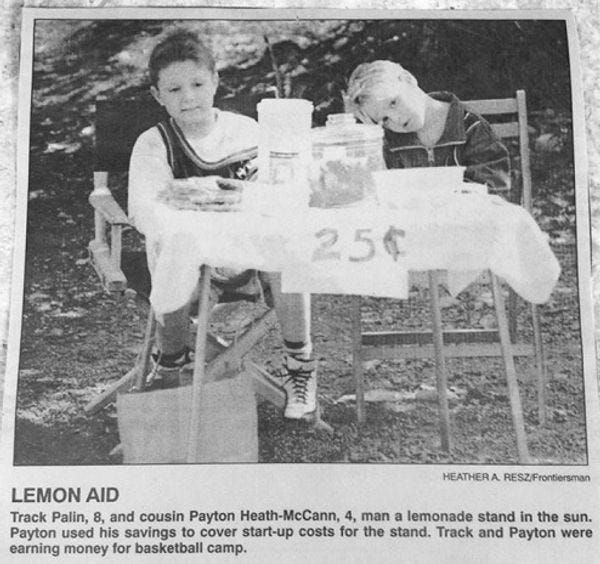Sarah Palin Doubts Barack Obama Has Ever Pulled Lemonade Out Of His Bootstraps
On her FaceSpace page yesterday, Sarah Palin posted this photo of her son and nephew from about 15 years ago, gettin' all mavericky and free-enterprisey one summer. She had this note:
When life gives you lemons, at this point make margaritas. Caving on debt could drive one to drink.
This photo of my son and nephew ran in our local newspaper about 15 years ago. I’m betting dollars to doughnuts our president skipped this universal childhood lesson in Economics 101, and perhaps that explains his problem understanding the tragedy to befall us as America drowns in debt. Running a lemonade stand teaches you to progress by the sweat of your brow and live within your means. It taught these boys that it was unacceptable and self-defeating to keep coming back to mama for more money for ingredients needed to concoct a product to sell to the public.
Gosh that's wise! And there's no way that Barack Obama ever ran a lemonade stand, seeing as how he is Not Really American -- he probably had a Roast Dog stand, haw-haw! Also, too, what's that you're saying about the economic lessons of lemonade stands?
Obviously more debt means less progress and opportunity to expand. Anyone who has run a business knows more debt equals less profit, and less profit means less ability to grow operations, employ more people, and even hold your head high above shortsighted economic decisions that history proves lead to failure.
Leaving aside the not-inconsiderable differences between a government and a for-profit business, we don't think Sarah Palin even has the slightest idea how real lemonade stands work. We're pretty sure we have never seen a lemonade stand "expand" or "employ more people." (Then again, we have little experience with lemonade stands crewed by families where more potential employees get squeezed out every ten months or so...)
Mostly, though, we just wanted an excuse to call attention again to this nifty piece by Michal Lemberger from a few months back; she correctly points out that running a lemonade stand doesn't teach a blessed thing about capitalism:
An exchange takes place between youthful lemonade vendors and their adult clients, but it’s not a capitalistic one. For adults, giving kids money is a chance to indulge in rosy-hued nostalgia. As for the kids, they get a chance to play “business,” just as they play dress-up or family. But adults usually fail to remember what the best part of the playacting is for the kids. My children, who were still young enough to think that two quarters add up to more money than a single dollar bill, were far more excited about giving out lemonade than about making money. It made them happy to see adults help them play out their vision of what a lemonade stand should be, cup by delicious cup. The only reason they sold lemonade instead of giving it away for free is that selling is a crucial part of the image of the lemonade stand.
The other main lesson, she told Marketplace's Kai Ryssdal, is even more elementary:
"They're learning that somebody will give them money if they're six and cute."
</p><p>And of course, despite Sarah Palin's insistence that "boys and girls all across our great nation would no doubt share their lessons learned about the danger of debt" with the President, it just might be worth pointing out that when a lemonade stand fails to make a profit or the kiddos just get bored of it -- like a minor-state governor who's had a taste of national attention -- the operators just fold up the chairs and card table and go inside to play Nintendo. It doesn't crash the world economy. So there's that. </p><p>[<a href="https: //www.facebook.com/photo.php?fbid=10151935701953588&l=33bcfd9b48" target="_blank">Facebook </a>/ <a href="http://www.marketplace.org/topics/business/lemonade-stands-not-ideal-pitcher-capitalism" target="_blank">Marketplace </a>/ <a href="http://www.slate.com/articles/life/drink/2013/07/lemonade_stands_don_t_teach_kids_anything_about_capitalism_or_entrepreneurship.single.html" target="_blank">Slate</a>]</p>




If you&#039;re not a part of the solution, you&#039;re the precipitate.
It&#039;s a business that the whole family can be involved in.